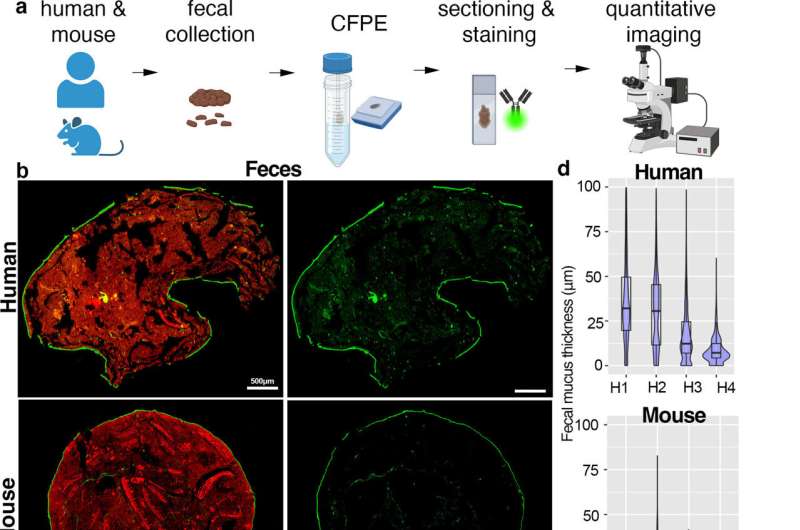This article has been reviewed according to Science X's editorial process and policies. Editors have highlighted the following attributes while ensuring the content's credibility:
fact-checked
trusted source
proofread
Mucus contains vital data to help address diseases such as inflammatory bowel disease and colon cancer

New research from UBC Okanagan could make monitoring gut health easier and less painful by tapping into a common—yet often overlooked—source of information: the mucus in our digestive system that eventually becomes part of fecal matter.
Researcher Dr. Kirk Bergstrom and post-graduate student Noah Fancy of UBCO's Biology department have discovered a non-invasive technique to study MUC2, a critical gut protein, from what we leave behind in the bathroom.
Theie findings are published in the Journal of Biological Chemistry.
"MUC2 is like the silent star in our guts. It's constantly working to protect us, and its proper functioning is crucial for our overall health," Dr. Bergstrom says. "It was originally thought that you could only access this important molecule from biopsies or tissue removed via surgery—highly invasive and painful procedures.
"However, our study shows mucus is actually a part of our stool, meaning we can get at it painlessly and at levels we could not before. Anytime we can do analysis non-invasively, it's a win."
Clues to health can be found in unexpected places, and Dr. Bergstrom's team found a way to study important gut health markers from fecal-adherent mucus, a term that—in simpler words—refers to the mucus attached to our stool. This mucus, typically ignored and flushed away, contains a trove of information about gut health.
MUC2, a glycoprotein with many sugar chains attached, forms a protective barrier in our intestines in the form of mucus, safeguarding our gut from harmful microbes and toxins and playing a crucial role in digestive health.
Understanding MUC2 better could lead to significant advancements in managing and preventing gut-related diseases, impacting the day-to-day well-being of millions.
"We can use these new methods to visualize mucus-microbiota interactions and how they go wrong in various diseases, like inflammatory bowel diseases and colon cancer," Dr. Bergstrom notes. "The sugars on the mucins also carry lots of information on the health status of the colon."
Master of Science student Noah Fancy led the work, which was the result of a strong collaborative effort between the Bergstrom Lab, the chemistry labs of Dr. Wesley Zandberg and the biology labs of Dr. Sepideh Pakpour, Dr. Deanna Gibson and Dr. Sanjoy Ghosh, all at UBC Okanagan.
More information: Noah Fancy et al, Fecal-adherent mucus is a non-invasive source of primary human MUC2 for structural and functional characterization in health and disease., Journal of Biological Chemistry (2024). DOI: 10.1016/j.jbc.2024.105675




















